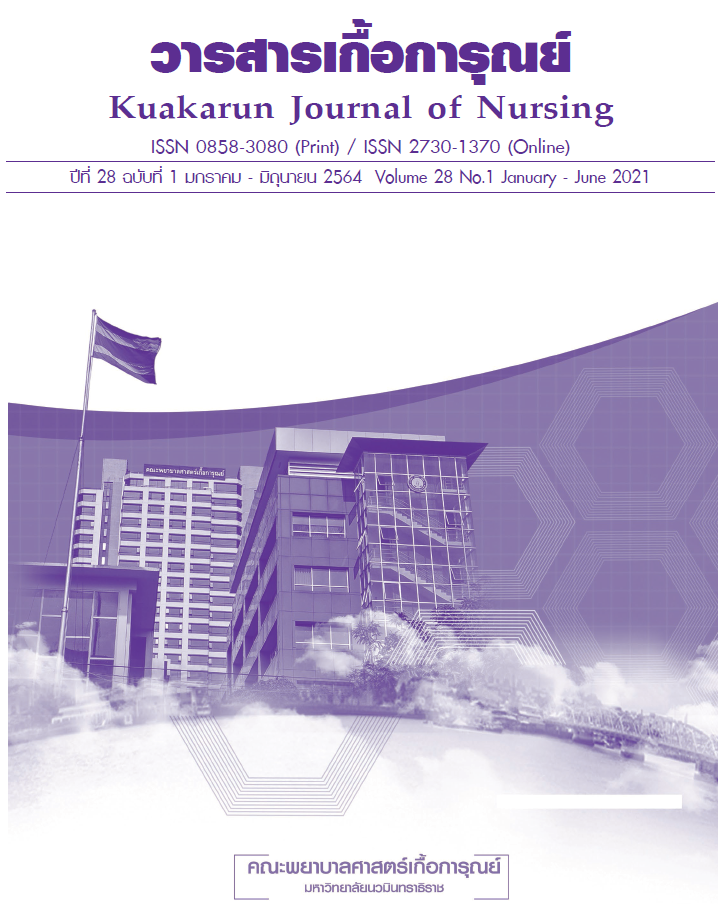การพัฒนาศักยภาพอาสาสมัครประจำครอบครัวในการดูแลผู้ที่มีภาวะพึ่งพิง
คำสำคัญ:
ภาวะพึ่งพิง, อาสาสมัครประจำครอบครัว, การรับรู้ความสามารถของตนเองบทคัดย่อ
การวิจัยกึ่งทดลองนี้มีวัตถุประสงค์เพื่อศึกษาผลของโปรแกรมการพัฒนาศักยภาพอาสาสมัครประจำครอบครัวในการดูแลผู้ที่มีภาวะพึ่งพิง โดยการประยุกต์ใช้ทฤษฎีการรับรู้ความสามารถของตนเอง ของแบนดูรา ต่อความรู้ในการดูแลผู้ที่มีภาวะพึ่งพิง ความเชื่อมั่นในความสามารถของตนเอง ความคาดหวังในผลลัพธ์ของการปฏิบัติ และทักษะการดูแลผู้ที่มีภาวะพึ่งพิง คัดเลือกกลุ่มตัวอย่างโดยการสุ่มอาสาสมัครประจำครอบครัวในอำเภอศีขรภูมิ จังหวัดสุรินทร์ กลุ่มทดลอง (n = 27) ได้รับโปรแกรมการให้ความรู้ การสอนสาธิตและฝึกทักษะ การแจกคู่มือ การเยี่ยมบ้านผู้ที่มีภาวะพึ่งพิง การฟังเรื่องเล่าประสบการณ์ และการสาธิตการดูแลผู้ที่มีภาวะพึ่งพิงจากอาสาสมัครประจำครอบครัวตัวแบบ การพูดระบายความรู้สึก การพูดชื่นชมและให้กำลังใจ และการโทรศัพท์ติดตาม เก็บข้อมูลด้วยแบบวัดความรู้เรื่องการดูแล ผู้ที่มีภาวะพึ่งพิง แบบวัดความเชื่อมั่นในความสามารถของตนเอง และแบบวัดความคาดหวังในผลลัพธ์ของ การปฏิบัติ ซึ่งมีค่าความเชื่อมั่น เท่ากับ .69 .90 และ .91 ตามลำดับ โดยการตอบแบบสอบถามในระยะก่อนการทดลอง หลังการทดลอง (สัปดาห์ที่ 2) และระยะติดตาม (สัปดาห์ที่ 4) และทำการประเมินทักษะ ด้วยแบบประเมินทักษะการดูแลผู้ที่มีภาวะพึ่งพิง ในระยะก่อนการทดลองและระยะติดตามผล (สัปดาห์ที่ 4) วิเคราะห์ข้อมูลโดยใช้สถิติไคสแควร์ สถิติทดสอบค่าที และสถิติบอนเฟอรโรนี
ผลการวิจัย พบว่า กลุ่มทดลองมีคะแนนเฉลี่ยของความรู้ในการดูแลผู้ที่มีภาวะพึ่งพิงภายหลังการทดลองและระยะติดตามผลสูงกว่าก่อนการทดลอง และสูงกว่ากลุ่มเปรียบเทียบอย่างมีนัยสำคัญทางสถิติ (p-value < .05) ส่วนคะแนนเฉลี่ยของความเชื่อมั่นในความสามารถของตนเอง และทักษะในการดูแลผู้ที่มีภาวะพึ่งพิงระยะติดตามผลสูงกว่าก่อนการทดลอง และสูงกว่ากลุ่มเปรียบเทียบอย่างมีนัยสำคัญทางสถิติ (p-value < .05) คะแนนเฉลี่ยความคาดหวังในผลลัพธ์ของการปฏิบัติระยะติดตามผลสูงกว่ากลุ่มเปรียบเทียบอย่างมีนัยสำคัญทางสถิติ (p-value < .05) ข้อเสนอแนะคือควรนำโปรแกรมฯ ไปใช้ในการจัดอบรมอาสาสมัครประจำครอบครัว เพื่อสร้างเสริมให้เกิดความเชื่อมั่นในความสามารถของตนเอง และสามารถดูแลผู้ที่มีภาวะพึ่งพิงในชุมชน ได้อย่างมีประสิทธิภาพ
เอกสารอ้างอิง
National Health Security Office (NHSO). Strategic plan for long-term care system for the dependent elderly 2014-2018 [Internet]. 2016 [cited 2016 Dec 20]. Available from:http://shi.or.th/upload/Download%20File/%E0%B8%A8%E0%B8%B8%E0%B8%81%E0%B8%A3%E0%B9%8C%E0%B9%80%E0%B8%AA%E0%B8%A7%E0%B8%99%E0%B8%B2%2056/FridaySem57/5_plan%20LTC.pdf (in Thai)
Foundation of Thai Gerontology Research and Development Institute (TGRI). Situation of the Thai elderly 2016. Nakhon Pathom: Printery Company Limited; 2017. (in Thai)
Primary Health Care Division. Family volunteers manual. Bangkok: The Agricultural Cooperative Federation of Thailand Limited; 2016. (in Thai)
Prombut P, Piaseu N, Sakulhongsopon S. Factors related to stress of family caregiver of patients with stroke at home. Ramathibodi Nursing Journal 2014;20(1):82-96. (in Thai)
Rimnin K, Wongvatunyu S, Monkong S. Effects of the communicating support program on the caregiver’s knowledge and self-efficacy to care for stroke patient with communication Impairment. Ramathibodi Nursing Journal 2016;22(3):293-309. (in Thai)
Innets T, Powwattana A, Pichayapinyo P. Self-efficacy enhancement with participatory learning of health volunteer for promoting the health behavior of the elderly with hypertension. Journal of Public Health 2011;41(1):5-16. (in Thai)
Bandura A. Self-efficacy: the exercise of control. New York: WH Freeman/TimesBooks/Henry Holt & Co; 1997.
Srijumnong N, Rawiworakul T, Lagampan S, Malathum P. The effects of a self-efficacy promotion program for family caregivers of persons with stroke at home. Journal of Health and Nursing Research 2010;26(1):28-43. (in Thai)
Hendrix CC, Bailey DE Jr, Steinhauser KE, Olsen MK, Stechuchak KM, Lowman SG, et al. Effects of enhanced caregiver training program on cancer caregiver's self-efficacy, preparedness, and psychological well-being. Supportive Care in Cancer 2016;24(1):327-36.
Polit DF, Hungler BP. Nursing research: principle and methods. 3rd ed. Philadelphia: Lippincott; 1987.
Wangpitipanit S, Panuthai S, Sucamvang K, Lasuka D, Jitapunkul S. Family caregiver capacity building program for older people with dependency in Thailand: a randomized controlled trial. Pacific Rim International Journal of Nursing Research 2016;20(1):18-32.
Phuangngoenmak S, Keawpan W, Pichayapinyo P, Hangwong U. Effectiveness of the strengthening diabetes care program: a randomized controlled trial with Thai nurse practitioners. Pacific Rim International Journal of Nursing Research 2019;23(1):18-31.
Sumanit S, Pookboonmee R, Santati S, Phumonsakul S. Effects of self-efficacy promotion on perceived self-efficacy of caregivers participating in care provided to critically Ill children. Ramathibodi Nursing Journal 2011;17(1):63-74. (in Thai)

















